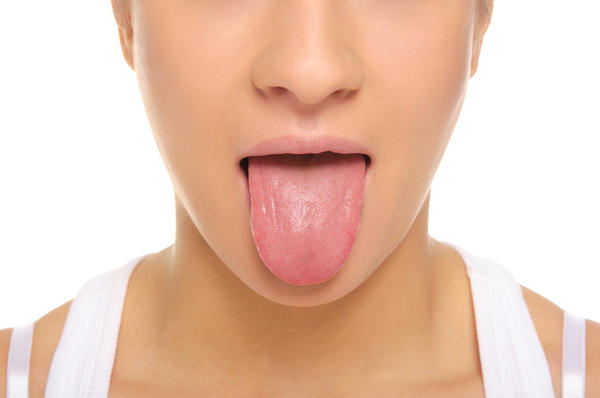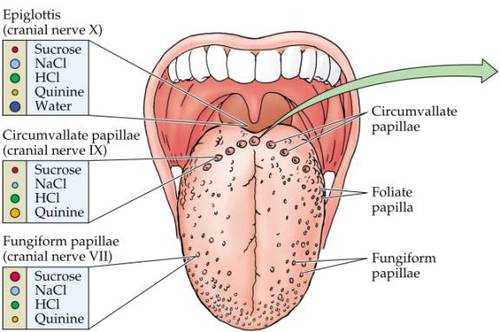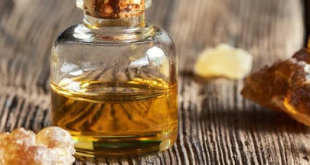Learn causes and treatment of swollen taste buds on front or back side of tongue. Inflamed taste buds and lie bumps are caused by enlarged papillae back of tongue.
Sometimes, you also see the enlarged tongue, black spots on tongue, bright red tongue, white taste bud surface or black dots on the tongue. Some of these symptoms are caused by alcohol poisoning, excessive use of tobacco, poor oral hygiene, fungal infection or dry mouth (xerostomia).
Thera are 2000 to 8000 taste receptors on tongue, esophagus, epiglottis, soft palate and cheeks to act as taste sensor. These taste receptors or taste buds are medically called lingual papillae, which give tongue its rough white texture.
Lingual Papillae are the tiny nipple-like structures on the tongue to detect the taste. There are four types of lingual papillae in humans i.e. circumvallate papillae (vallate papillae), fungiform papillae, filiform papillae and foliate papillae. All except the filiform papillae are taste buds. Different taste buds can sense different tastes like sweetness, saltiness, sourness, and bitterness. The taste buds on tongue sense specific type of taste e.g tip of our tongue can detect sweetness. Back side of the tongue can sense bitterness. Salty taste buds are present on the sides of the tongue.
Swollen or Inflamed Taste Buds on Tongue
Do taste buds grow back? Yes! normally taste buds grow back. Swollen taste buds result in enlarged papillae on the tongue, which can not be tasted foods and drinks. Commonly, taste buds grow back but in some cases of burnt taste buds or dead taste buds medical treatment is required. This article describes swollen taste buds causes and remedies.
Swollen Taste Buds on Tongue Causes
There are many causes of the swollen tongue due to swollen, inflamed, painful and irritated taste buds. These include factors resulting in enlarged taste buds. The main causes of swollen tongue or swollen taste buds are:
-
Hot foods or drinks
Hot foods and drinks with very high-temperature cause burned taste buds on the tongue. This is most common cause of swellon tongue and inflamed taste buds. All of us have experienced it at least once in our lives, by drinking very hot coffee, tea or soup.
-
Spicy foods with High acidity or saltiness
Spicy, acidic and salty foods cause swollen taste buds. These foods cause taste receptors on the tongue to irritate and swell. These spicy food are the one what causes lie bumps on your tongue. Lie bumps on the tongue are the hypertrophic, red and white painful bump on tip of tongue medically called transient lingual papillitis.
-
Oral hygiene and mouth diseases
Poor oral hygiene or mouth and gum diseases cause taste buds to swell. These oral conditions include oral cancer, oral thrush, mouth ulcers, candidiasis and canker sore on the tip of the tongue. Individuals who have acquired mouth ulcers or infections in the first place are very susceptible for inflaming their taste buds. Oral thrush or oral yeast infections are clinically found to be common roots for the inflammation of taste buds.
-
Swollen Taste Buds STDs
Inflamed taste buds STDs are the sexually transmitted disease that can affect oral health, These includes oral STDs that effects tongue and its papillae. Most common STDs that can cause inflamed or swollen tastebuds are:
Oral Herpes (HPV HSV-1) type 1 (HSV-1) causes fever, blisters and cold sores. The human papillomavirus (HPV) disease can cause sores on anywhere in the body including mouth cavity and tongue. It can make inflamed papillae and result in swellon tongue with painful taste buds.
Syphilis is a chronic bacterial STD, contracted by sex with infected person. It is so dangerous that it can genetically transfer to the kids (fetus) during pregnancy. It can cause sores and swelling in tongue, mouth and lips.
Oral Gonorrhea may also be responsible for swollen tastebuds by causing bumps on the back of the tongue and sore throat. Beside soreness of throat it causes swallowing difficulties and yellowish or white exudates.
-
Tobacco or Alcohol posining
Toxics material can irritate or even aggravate the presence of inflammation. High tobacco chewing or alcohol consumption can also cause swollen taste bud on the tongue. Alcohol and tobacco irritate taste receptors and cause infections that lead to inflamed taste buds.
-
Acid Reflux and Acidity
Avoid foods that cause acidity. Because acid reflux causes gastric acid regurgitation, which results in irritated taste buds, mouth, and tongue. The acid in the regurgitated food causes the irritation.
-
Tongue biting, twitching or rubbing
Does tip of your tongue hurts? Bite on your tongue, injuries or wounds can irritate taste buds leaving them inflamed. You can also get inflamed taste bud from tongue scraping. Some people have the habit of biting tongue in sleep or depression. Tongue biting or twitching can result in a painful bump on tip of tongue.
-
Physical Injuries
Physical injuries may lead to the tongue inflammation. These includes lacerations, burns, and cuts received during daily life or performing dental procedures. Surgical procedures such as laryngectomy for the removal of the extra larynx can cause the inflammation of taste of buds.
-
Allergies or Allergic Reactions
Some medicines, foods, dental care products can trigger allergic reactions. These allergies to some particular drug substance or oral product cause taste buds to be inflamed.
-
Depression, Anxiety and Stress
Depression, anxiety and high-stress level can cause swelling of taste buds. Some people get swollen tongue when stressed because stress lowers immunity level and causes hormonal imbalance, increasing the chances of infection.
-
Malnutrition
Some specific nutrients such as Vitamin B complex, vitamin C, and folate can predispose one from acquiring mouth problems. Deficiency in these vitamins may lead to swollen tongues such as that seen in scurvy or vitamin C deficiency.
-
Other Causes
Other possible causes of swollen tongue/taste buds include rashes that are due to thrush, exposure to pesticides, using strong mouthwashes, ill-fitting dentures, invasive carcinomas, chemotherapy, or radiation therapy.
Inflamed Taste Bud Treatment
You doctors may prescribe various medical treatment for swollen taste buds depending on the cause. Different swellon taste buds reasons demand different treatment approaches. For example, your doctor may recommend Vitamin C and B complex for taste buds swelling caused by nutritional deficiency. But tongue swelling caused by bacterial or viral infections may require antivirals and antibiotics drugs.
For common swellon taste buds and enlarged papillae treatment, even using general soothing agents will work well.
How to get rid of Swollen Taste Buds and Bumps on your Tongue
You can get rid of swollen taste buds due to inflammation using home remedies. Natural home remedies can be quite effective in reducing taste buds inflammation and swelling of the bumps on your tongue. You can use the following natural home remedies for lie bump cure and swollen tongue treatment to get taste buds back:
-
Apply Ice
Applying ice on the swollen areas of your tongue will relieve the swelling. You can use ice cubes to soothe your tongue but you must be careful not to burn it. They can burn your tongue if you keep them on your tongue for long.
-
Swashing Honey
Honey is the best home remedy for swollen taste buds because it has healing and anti-bacterial properties. Swashing honey in your mouth or tongue relieves swelling. You can also make a warm honey solution and gargle it several times in your mouth.
-
Glycerin
If your taste buds swell because of mouth sores or physical injuries, apply glycerin on the affected areas. Glycerin heals an inflamed tongue and taste receptors.
-
Baking Soda
The anti-inflammatory properties in baking soda make it an effective remedy to inflamed taste buds. You can apply baking soda on the affected areas and leave it there to reduce the swelling and irritation. Baking soda removes the gastric acid in your mouth from regurgitated food, which causes sore taste buds.
-
Gargle with Salt Water
Add one teaspoon of salt to lukewarm water until it dissolves to form a salt solution. Gargle your mouth with this solution to relieve the swollen areas. To treat a swollen taste bud on the tip of the tongue, gargle the solution at least three times every day. This will also relieve swollen buds at the back of your tongue.
-
Tea Tree Oil
Tea tree oil can relieve swollen tongue. Mix a few drops of this natural oil with warm water and gargle your mouth with the mixture. This solution is very effective in reducing swelling that is caused by bacteria in the mouth. Be careful with this remedy because excess tea tree oil may cause hallucinations.
-
Hydration an Probiotics
Dehydration and a dry mouth will cause sore and swollen taste buds. Take lots of fluids every day to hydrate your tongue and reduce the irritation. Alternatively, take probiotic yogurts for a fast relief from irritated taste receptors.
Pepper, Ginger and Garlic
Use the three ingredients to make a solution and take it at least four times in a day. This solution is very effective when bacteria cause a swollen taste bud on tip of tongue.
Prevent Enlarged Papillae (Swollen taste buds) on tongue
Prevention is always better than cure. You can prevent swollen taste buds (Enlarged Papillae) resulting in the swellon tongue by avoiding above-mentioned tastebuds inflammation root causes. To help prevent the occurrence of inflamed taste buds, you need to:
- Avoid extremely hot drinks (coffee, tea or soups) and spicy acidity causing foods.
- Maintain oral hygiene and follow oral health best practices, to avoid oral diseases and to reduce chances of any infections.
- Use condoms, avoid oral sex or adopt safe sexual practices while performing fellatio or cunnilingus to minimize risk of STDs. If possible get yourself HPV Vaccine.
- Quit smoking or chewing tobacco. And avoid heavy drinking. You can treat alcohol addiction with home remedies.
- Do not bite your tongue to decrease the risk of physical injuries and infections.
- Avoid rubbing or scraping your tongue with objects or even your teeth. Furthermore, ensure you use your toothbrush carefully to avoid scrubbing or rubbing your papillae too much
- Know your drugs, food and environmental allergies to avoid causing you swellon taste buds. You can treat Allergy with natural remedies.
 Health & Care Information
Health & Care Information 



